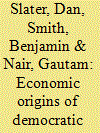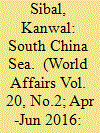| Srl | Item |
| 1 |
ID:
132627


|
|
|
|
|
| Publication |
2014.
|
| Summary/Abstract |
Within the last twenty years, China has become dependent on import of coal, oil and natural gas. Especially oil is now an economic and a security concern by the Chinese regime and key international stakeholders. Until 2035, China will account for one fourth of the global net growth in global gas consumption and more than half of the net growth in oil consumption. The future demand cannot be covered by China×s own conventional and unconventional sources. Pipelines from neighboring countries can cover more than half of the needed import of natural gas by 2030, but only 10 percent of the import demand of oil is secured so far. Even if China attempts to address its insufficient supply of oil by increased investments in overseas oil fields, there is still a large gap. Furthermore, the oil import will largely come from politically unstable countries and regions, and the bulk of the supplies must be shipped through the potentially insecure Hormuz and Malacca Straits. The ongoing territorial disputes with neighboring countries regarding areas with gas and oil reserves in contested waters bear evidence to regional conflict potentials, and China appears to engage more actively in energy diplomacy and regional cooperation.
|
|
|
|
|
|
|
|
|
|
|
|
|
|
|
|
| 2 |
ID:
130648


|
|
|
|
|
| Publication |
2013.
|
| Summary/Abstract |
The committee's report has highlighted the diversity of the countries of the Indian Ocean Rim and the multiple ways it which these states can be categorised. This diversity and the lack of a single agreed definition of the 'Indian Ocean Rim' has created a significant challenge for the development of policy, from both an Australian and a regional perspective. Australia's approach to trade in the Indian Ocean Rim is largely bilateral; defence and strategic relations are based on single issue groupings; and aid to the region is predominately provided under the auspices of the United Nations. Evidence gathered in relation to the Indian Ocean Rim Association for Regional Co-operation (IOR-ARC) demonstrates clearly that diversity in the region - both economic and political - has created inertia in the region's main organisation.
|
|
|
|
|
|
|
|
|
|
|
|
|
|
|
|
| 3 |
ID:
132974


|
|
|
|
|
| Publication |
2014.
|
| Summary/Abstract |
From Aristotle to Acemoglu and Robinson, scholars have argued that democracy possesses powerful redistributive impulses, and imperils itself accordingly. We challenge the validity of the redistributive model of democratic breakdown in the postcolonial world-the only cases where democracies have collapsed since World War II-because its assumptions regarding state power are questionable or even inapplicable in postcolonial settings. Our correlative analysis of cross-sectional time series data from 139 countries between 1972 and 2007 indicates that, contrary to the expectations of the redistributive model, redistributive taxation is negatively associated with the incidence of military coups and the likelihood of democratic breakdown. Furthermore, authoritarian takeovers do not appear systematically to result in reduced redistribution from the rich. More fine-grained historical evidence from Southeast Asia-a region where the redistributive model should be especially likely to hold true-further affirms that authoritarian seizures of power are neither inspired by successful redistributive policies nor followed by their reversal. Taken together, these quantitative and qualitative data offer significant support for our central theoretical claim: contemporary democratic breakdowns have political origins in weak states, not economic origins in class conflict.
|
|
|
|
|
|
|
|
|
|
|
|
|
|
|
|
| 4 |
ID:
133963


|
|
|
|
|
| Publication |
2014.
|
| Summary/Abstract |
This article discusses the relationship between three language communities in Europe with variant levels of official recognition, namely Kashub, Sorb, and Silesian, and the institutions of their host states as regards their respective use, promotion, and revitalization. Most language communities across the world campaign for recognition within a geographic/political region, or on the basis of a historic/group identity to ensure their language's use and status. The examples discussed here illustrate that language recognition and policies resulting therefrom and promoting official monolingualism strengthen the symbolic status of the language but contribute little to the functionality of language communities outside the area. As this article illustrates, in increasingly multilingual societies, language policies cut off its speakers from the political, economic, and social opportunities accessible through the medium of languages that lack official recognition locally.
|
|
|
|
|
|
|
|
|
|
|
|
|
|
|
|
| 5 |
ID:
146708


|
|
|
|
|
| Contents |
Faced with the rapid rise of the global power of China and its claims in the South China Sea, India has been bolstering cooperation with Vietnam, Japan and Australia to protect maritime security and freedom of navigation according to international laws of the seas in the Indo-Pacific region. India and the US have also strengthened relations in the interest of regional security. While New Delhi does not wish to isolate or ignore Beijing but rather include it in evolving international agreements, growing Chinese military influence in the Indian Ocean and Bay of Bengal remains one of India’s main concerns.
|
|
|
|
|
|
|
|
|
|
|
|
|
|
|
|